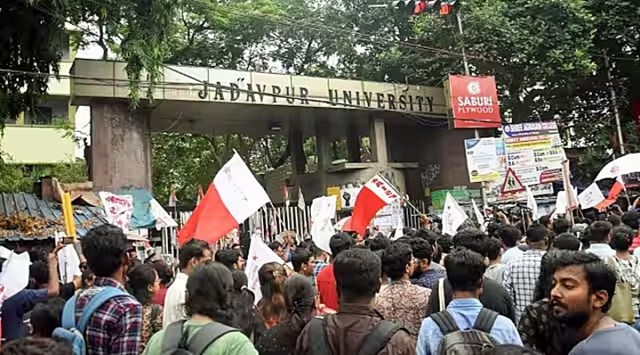Jadavpur University issues night curfew for hostel boarders, puts restrictions on visitors
All the hostels' main entrance gates will be closed at 10 pm daily and opened only at 6 am the next day, in a bid to prevent the free entry and exit of outsiders, including former students.
 University hostel/mess employees residing at main hostel campus quarters should carry the university identity card to avoid any trouble while entering/exiting out of the hostel campus, the notice read. (ANI file photo)
University hostel/mess employees residing at main hostel campus quarters should carry the university identity card to avoid any trouble while entering/exiting out of the hostel campus, the notice read. (ANI file photo)
More than a month after an alleged ragging victim died at the main hostel of Jadavpur University in Kolkata, the varsity has now come up with a set of strict rules and regulations for students staying at all its hostels.
A notice issued by JU authorities Wednesday asked not to remain outside after 10 pm. It also said prior permission must be taken from hostel superintendents concerned in case of absence.
According to the notice, all the hostels’ main entrance gates will be closed at 10 pm daily and opened only at 6 am the next day, in a bid to prevent the free entry and exit of outsiders, including former students.
Students are also instructed to carry their hostel ID cards. As per the notice, they must produce these when asked by security staff to prove their identity.
Boarders have been allowed to be with their respective visitors in visitors’ room or TV-cum-recreation room when a specific visitor room is unavailable. “Visitors must carry their ID proof and register their names with address and mobile numbers in the hostel visitors’ entry/exit register kept at the entrance of the hostel under the custody of the darwans/ security personnel posted thereon,” the notice stated.
Students will always have to carry their identity cards along with them, and they will have to produce these as and when the administrative staff or officials seek it.
University hostel/mess employees residing at main hostel campus quarters should carry the university identity card to avoid any trouble while entering/exiting out of the hostel campus, the notice read.
On August 9, a 17-year-old student who hailed from the Nadia district in West Bengal, died hours after allegedly falling from the balcony of his second-floor hostel room.
An internal inquiry committee recently submitted its report where it pointed to an endemic culture of ragging on the campus and how the authorities of the premier higher education institution failed to check the menace.
The committee identified 35 senior students and six alumni/unauthorised boarders who were allegedly “involved in ragging” at the main hostel. It also identified four senior and six former students as the main culprits.
The university has now set up a 55-member anti-ragging squad on the campus. Previously, the team consisted of only 18 members. The anti-ragging squad members will remain within 5 km of the university campus to respond quickly in an emergency.
“The number of members in the squad has been increased so that a large area can be covered in an emergency. The more people are involved, the more we can respond quickly. They will actively work and respond to any emergency,” said JU interim vice-chancellor Buddhadeb Sau.
A university student and a member of the Arts Faculty Students Union (AFSU) told The Indian Express, “The vice-chancellor did not discuss it with us before issuing the notice. We always wanted the former students to be driven away from hostels. But strict restrictions must not be imposed for normal boarders. We will discuss the matter in our general body meeting before we can make our official stand clear on this.”







